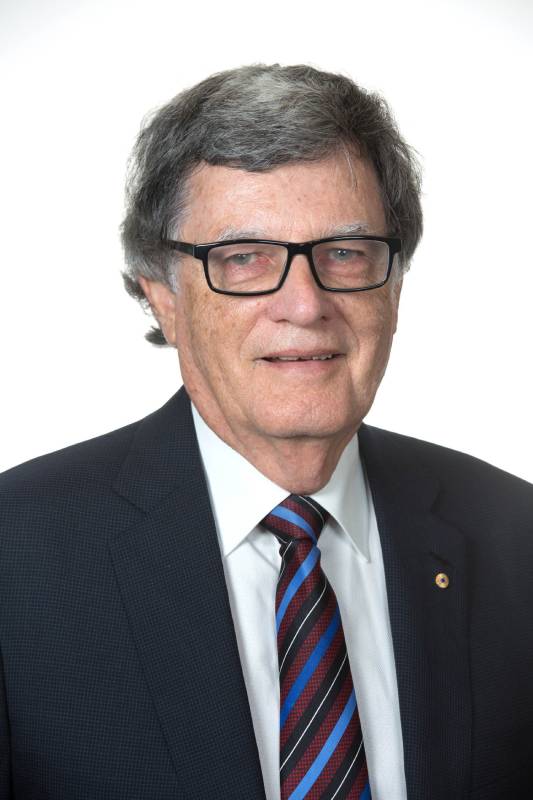Jubilee Fellow – 2018

Emeritus Professor Peter W. Sheehan AO
BA, PhD (Sydney). Honorary Fellow
Discipline: Psychology
Year Elected: 1978
2018 Reflections
Together with others, I have been invited to pass comment on five issues. I chose to consider them separately, but they represent a special “whole” when considered together.
My Research When a Fellow
When I became a Fellow, I was researching into human consciousness, especially those aspects of it that can be dissociated from normal cognitive functioning. Such features of consciousness can be studied empirically, and with relative ease, in subjects who are hypnotised. I have always been especially curious about our ability “to know, but not know that we know”. Aspects of our awareness can be “registered” in our consciousness, so to speak, without our knowledge that this has occurred. I find that phenomenon fascinating, and it has influenced my research for some 40 years.
Early Reflections on the Academy
My earliest reflections of the Academy was a feeling of profound appreciation of the quality of intellect of those I was engaging with in the Academy. I felt surrounded in the Academy by people of great intelligence who went about their daily life, without being aware of the worth of who they were, and what they were doing. In the period of my Presidency, in particular, I marvelled at the way so many scholars across the Social Sciences contributed to their disciplines and to their professions in an informed, reflective, and often self-effacing way.
Notable Stories of Scholars in the Academy
I find this the hardest of the issues to address. There were so many notable scholars, it is difficult to single out particular individuals when comments about them can be taken as offering opinions about “the more deserving”. One of the special features of the Academy is the extent to which scholars within it have facilitated the interdisciplinary significance and relevance of cognate disciplines to their own discipline. In this respect, and by no means exclusively, I think of the interactions that have occurred with Don Aitkin (Political Science), Paul Bourke (Demography), Fay Gale (Geography), Jacqueline Goodnow (Psychology), Keith Hancock (Economics), Frank Jones (Sociology), Bruce Miller (Political Science), and Peter Shergold (Economic History), four of whom have sadly passed away. Looking back on my involvement with them and others in the Academy, my memories are of enormously competent colleagues, who have given the Academy every reason to be proud of what it has achieved.
The Purpose of the Academy and What It Should Strive For
A major purpose of the Academy is to fulfil its Mission with integrity that informs strength of advocacy. Our Academy must strive to enhance the Social Sciences, and I believe it must do all that it can to demonstrate the relevance of the Social Sciences to practical issues impinging on, and affecting the welfare of those who live in our Society. There will always be issues of monumental social concern that affect us, and the Academy is especially well equipped to pursue their relevance through informed, reflective, and scholarly comment.
My Contributions to the Social Sciences
I can only comment on what I have done that I find most satisfying to myself. My most satisfying research has been to conduct a 9-yr. investigation of a phenomenon that flashed by me, almost unnoticed, one day in an experimental laboratory in the USA. I experienced that moment in America, and researched for almost a decade to understand it back in my own country.
Professionally, as past Chair of the Australian Research Grants Committee, I have tried to practice the excellent ideals I consistently saw in the Academy: Research of the highest quality should be rewarded financially, and supported by Government at every level.
The quality of University administration is very important. As Vice-Chancellor of an Australian University, my most satisfying experience was to take the community that I served to a higher level of recognition of their competency. My task was to create public awareness of the abilities that were evident to me, fostering recognition in ways that gained for them accolades and recognition from their peers.
Proudest Achievements in my Career
Making subjective comment, I have been most satisfied (and challenged) by trying to administer a tertiary institution of learning, humanely. “Humanely” to me meant never letting bureaucracy or officialdom overtake what was good or worthy in those I was responsible for. I believe Universities function best, and most creatively, when they are allowed to operate under conditions of minimal compliance to the heavy demands of rigid bureaucracy.